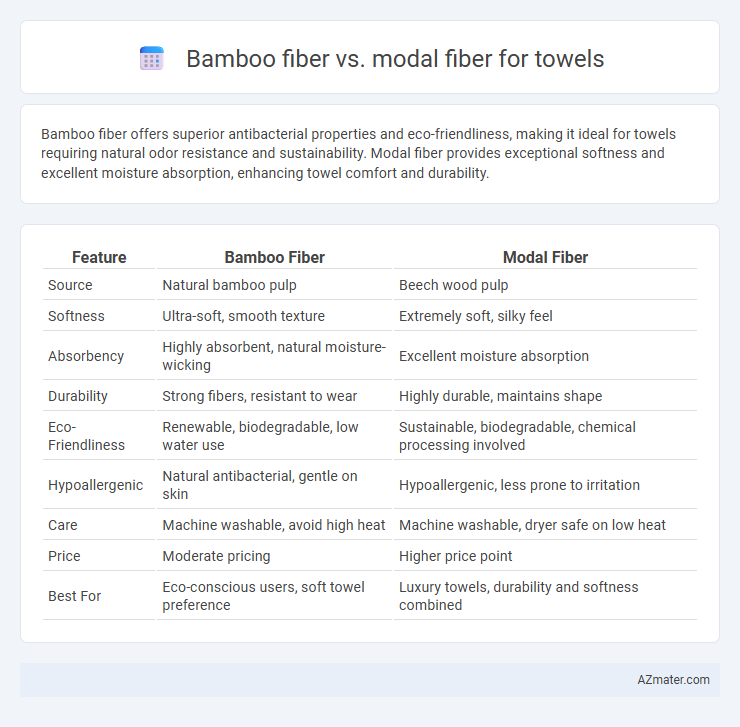Bamboo fiber offers superior antibacterial properties and eco-friendliness, making it ideal for towels requiring natural odor resistance and sustainability. Modal fiber provides exceptional softness and excellent moisture absorption, enhancing towel comfort and durability.
Table of Comparison
| Feature | Bamboo Fiber | Modal Fiber |
|---|---|---|
| Source | Natural bamboo pulp | Beech wood pulp |
| Softness | Ultra-soft, smooth texture | Extremely soft, silky feel |
| Absorbency | Highly absorbent, natural moisture-wicking | Excellent moisture absorption |
| Durability | Strong fibers, resistant to wear | Highly durable, maintains shape |
| Eco-Friendliness | Renewable, biodegradable, low water use | Sustainable, biodegradable, chemical processing involved |
| Hypoallergenic | Natural antibacterial, gentle on skin | Hypoallergenic, less prone to irritation |
| Care | Machine washable, avoid high heat | Machine washable, dryer safe on low heat |
| Price | Moderate pricing | Higher price point |
| Best For | Eco-conscious users, soft towel preference | Luxury towels, durability and softness combined |
Introduction to Bamboo and Modal Fibers
Bamboo fiber is derived from the pulp of bamboo grass, known for its natural antibacterial properties, breathability, and eco-friendliness, making it a sustainable choice for towels. Modal fiber, produced from beech tree cellulose, offers exceptional softness, durability, and moisture-wicking abilities, often blended with cotton to enhance towel absorbency and smoothness. Both fibers provide distinct advantages in towel manufacturing, with bamboo emphasizing sustainability and antimicrobial benefits, while modal focuses on comfort and longevity.
Overview of the Towel Market Trends
Bamboo fiber and modal fiber towels are gaining traction in the towel market due to their sustainability and softness, catering to eco-conscious consumers. Bamboo fiber towels are prized for their natural antibacterial properties and moisture-wicking abilities, while modal fiber towels offer superior durability and a silky texture that resists shrinking. Market trends show increasing demand for organic and sustainable textiles, with towel sales driven by consumer preference for hypoallergenic and eco-friendly materials.
Production Process: Bamboo vs Modal Fibers
Bamboo fiber production involves harvesting bamboo stalks, mechanically crushing them, and then chemically processing to extract cellulose before spinning into yarn, emphasizing eco-friendliness due to bamboo's fast growth and renewability. Modal fiber is produced from beech tree pulp through a more intensive chemical process involving the dissolution of cellulose with sodium hydroxide and carbon disulfide, yielding a fiber known for its softness and durability but raising concerns about chemical use. Both fibers undergo wet spinning but differ significantly in their raw material sourcing and chemical treatments, impacting sustainability and fiber characteristics in towel manufacturing.
Environmental Impact and Sustainability
Bamboo fiber stands out for its rapid renewability and lower water consumption, making it a highly sustainable choice for towels compared to traditional fibers. Modal fiber, derived from beech trees, is biodegradable and produced through less chemically intensive processes, contributing to a reduced environmental footprint. Both fibers offer eco-friendly properties, but bamboo's fast growth and minimal pesticide use often position it as the more environmentally responsible option.
Absorbency and Drying Performance
Bamboo fiber towels exhibit superior absorbency due to their micro-gaps and micro-holes, which enhance moisture retention and allow them to absorb up to three times their weight in water. Modal fiber towels, derived from beech wood, also offer excellent absorbency but typically fall slightly below bamboo in moisture uptake capacity. In terms of drying performance, bamboo fiber towels dry more quickly because of their natural breathability and moisture-wicking properties, while modal towels provide a soft texture but may retain moisture longer, leading to slower drying times.
Softness and Comfort Comparison
Bamboo fiber towels exhibit superior softness due to their naturally smooth and round cellulose fibers, which create a gentle and comfortable texture ideal for sensitive skin. Modal fiber towels also offer excellent softness, often described as silkier and more flexible, resulting from their semi-synthetic process derived from beech tree pulp. When comparing comfort, bamboo towels excel in moisture-wicking and breathability, enhancing drying efficiency, while modal towels provide enhanced durability and color retention, contributing to long-lasting plushness.
Durability and Longevity of Towels
Bamboo fiber towels exhibit strong durability due to their natural antibacterial properties and high tensile strength, making them resistant to wear and tear over time. Modal fiber towels are also durable, with excellent resistance to shrinkage and fading even after multiple washes, maintaining a soft texture and shape. Between the two, bamboo fiber tends to offer longer longevity in towels because of its moisture-wicking capabilities and antimicrobial nature, which help prevent odor and fabric degradation.
Hypoallergenic and Skin-Friendly Properties
Bamboo fiber towels are naturally hypoallergenic and antimicrobial, making them ideal for sensitive skin and reducing the risk of irritation or allergic reactions. Modal fiber, derived from beech trees, is also gentle on the skin due to its smooth texture and high moisture absorbency, which helps maintain skin hydration and comfort. Both fibers offer excellent breathability and softness, but bamboo fiber's inherent antibacterial properties give it a distinct advantage for hypoallergenic towel options.
Price and Accessibility
Bamboo fiber towels generally offer a more affordable price point compared to modal fiber towels, making them a popular choice for budget-conscious consumers. Bamboo fiber is widely accessible due to its sustainable production and growing market demand, while modal fiber, derived from beech trees, tends to be pricier and less commonly available in mainstream retail. Both fibers provide softness and absorbency, but bamboo fiber's lower cost and greater availability give it an edge in the towel market.
Choosing the Best Fiber for Your Towel Needs
Bamboo fiber offers natural antibacterial properties, high absorbency, and eco-friendliness, making it ideal for sensitive skin and sustainable choices in towels. Modal fiber provides exceptional softness, durability, and superior moisture retention, ensuring long-lasting, plush towels that dry quickly. Selecting the best fiber depends on prioritizing either sustainability and antimicrobial benefits with bamboo or enhanced softness and resilience with modal for daily towel use.

Infographic: Bamboo fiber vs Modal fiber for Towel
 azmater.com
azmater.com